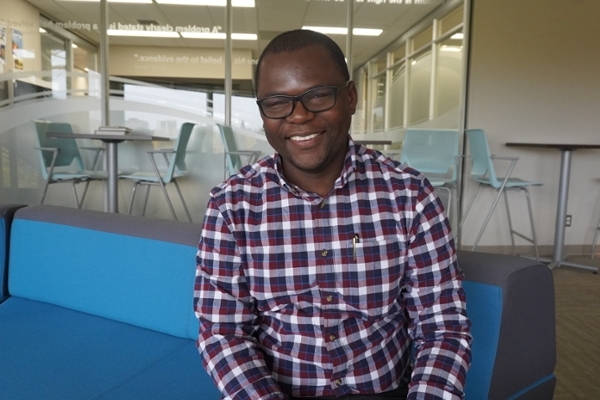
From government to graduate school
Leaving a steady and rewarding career in government for graduate school at the University of Saskatchewan (USask) was a difficult choice, but it is one decision that Privilege (Priva) Haang’andu counts himself privileged to be able to make.
By Erica Schindel, Marketing and Communications SpecialistAs a political specialist for the U.S. State Department embassy in Lusaka, Zambia, Haang’andu spent three years conducting research and providing advice to the American government on Zambian policy issues.
“Most requests from Washington, D.C., regarding political and economic advice on Zambia, would come across my desk,” said Haang’andu. “This included researching and drafting congressional reports on topics ranging from human rights to international religious freedom to child labour.”
Although this type of work was exciting and helped him fine-tune his research interests, Haang’andu always knew that he was destined to enter academia.
Having completed a master’s degree in political science from Marquette University in Wisconsin, he looked across North America to find an interdisciplinary doctoral program. Although he considered several programs in Ontario, he was ultimately drawn to the Johnson Shoyama Graduate School of Public Policy (JSGS) at USask.
“Of all the places I looked, the JSGS was the most diverse and I was profoundly attracted by the research strength of the faculty,” said Haang’andu, who will receive his PhD at USask Fall Convocation on Nov. 13.
With former USask professor Dr. Daniel Béland (PhD)—now at McGill University—serving as his supervisor, Haang’andu embarked on an academic journey in which he completed his doctoral program in three years—a record at JSGS.
“He is one of the best students I have ever supervised,” said Béland. “Not only is he extremely smart, but he is also passionate about both intellectual life and concrete social and policy change on the ground. Priva is an outstanding student who will truly make a difference in the world, in Canada and well beyond.”
Haang’andu credits his advisor, and now friend and co-author, with introducing him to the real world of being a scholar.
“Daniel was a committed and thorough advisor. I could send him 100 pages to read in the morning; by that evening, he got back to me with notes and comments on every page,” said Haang’andu. “He encouraged me to immerse myself in information, and to work really fast and hard—to excel beyond what I had imagined.”
Haang’andu moved from Zambia to Saskatoon with his wife, three-year-old daughter, and three-month-old son and had to find a new work-life balance. The added challenge makes his accomplishment that much more rewarding.
“It was not easy,” he said. “Often my wife would be at work, and I’d be writing my dissertation at the park with my kids. I made it work and was even able to produce seven publications during this time.”
Having grown as a scholar, Haang’andu was encouraged to apply to teach an upper-year political studies class, the first time he taught a Canadian course to Canadian students.
“You get to a point where you have over-winning confidence, you have read so much that there is no situation that is scary,” he said.
That confidence, combined with support and guidance from the Gwenna Moss Centre for Teaching and Learning and mentorship from Dr. Joe Garcea (PhD), ensured that Haang’andu would have a rewarding experience with his 60+ students.
Haang’andu is now taking a well-earned break from academia. As Development and Peace Caritas Canada’s regional manager in Saskatchewan and Keewatin-Le Pas, he is educating people in grassroots organizations on climate change and the need to conserve nature, particularly as it relates to the effect of deforestation in the Amazon and the balance on the ecosystem. Although it is not public policy work in the traditional sense, Haang’andu still finds himself entrenched in policy issues.
“As a policy school, JSGS’s interdisciplinary nature prepares you to be whatever you want to be,” he said. “Here, you engage with the literature, ideas, and concepts to the extent that you want to narrate your own story, to engage with your arguments and perspectives. If you have a passion and the right institution, with the right support and supervisor and committee, you can accomplish anything.”

